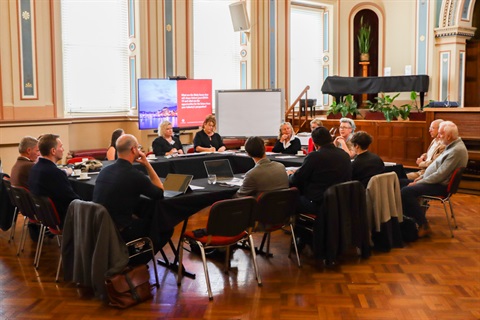
Increased inner-city living has been identified as a key driver of future economic growth in Hobart at this week’s Economic Development Roundtables.
Representatives from a range of business sectors have participated in eight industry-themed roundtable forums that will drive the City of Hobart’s development of a long-term economic growth strategy.
The discussions uncovered and explored various challenges and opportunities, with broad support expressed for inner-city residential growth.
“The Central Hobart Precincts Plan Discussion Paper has shown us that the inner city of Hobart can comfortably house an extra 7000 people through well-planned, appropriate development,” City of Hobart CEO Kelly Grigsby said.
“This would, in turn, support our retail and service industries, and further enhance and expand our vibrant night time economy, which already accounts for 8.5 per cent of our city’s economy.”
The roundtables also highlighted a desire for Hobart’s unique identity to be more vigorously embraced and promoted to build business opportunities and attract customers.
“The forums identified opportunities to better support our growing creative industries, and to leverage our status as an Antarctic Gateway City and home to some of the world’s most preeminent climate scientists to further expand Hobart’s science and research capabilities.”
Attracting and retaining professional talent has been identified among the challenges facing Hobart’s business community.
“Affordable housing and rental availability was found to be a barrier to attracting and retaining young people, in particular, across a range of industries,” Lord Mayor Anna Reynolds said.
“We’ve known for a long time that the housing crisis is impacting our community, but this is the first time we’ve really discussed its effect on businesses.
“Some industries are really struggling to recruit quality staff and that is having an impact on their frontline services and the way they do business.”
Cr Reynolds said positive experiences were shared around the table, as participants explored the strengths and opportunities that supported Hobart’s business community.
“It was great to hear from businesses about what’s worked well for them and the positive interactions they’d had with the City of Hobart,” Cr Reynolds said.
Participating in the final day of roundtables, Bradley Munnings of technology start-up 7K Labs said Hobart had the potential to become an international technology hub, and welcomed the opportunity to contribute to the City’s 10-year Economic Development Strategy.
“The tech industry start-ups that are already coming out of Tasmania are doing incredible things on a global scale,” Mr Munnings said.
“These roundtables are a great way to collaborate – I’m looking forward to being a sponge and just taking it all in and learning from other people’s experiences, as well as sharing my own.
“To have an economic development strategy for Hobart will put us all on the same page. If we’re all working from the same plan, we can all see where the opportunities are.”
CEO Kelly Grigsby said the roundtables were providing valuable insight into the inner workings of Hobart’s major business sectors.
“We went into these discussions ready to listen and learn, and we value the contributions of those who have been willing to share their thoughts, ideas and experiences with us,” Ms Grigsby said.
“These roundtables are an important first step in developing a 10-year Economic Development Strategy that will guide how the city responds to the challenges and opportunities that will impact the city over the next decade.
“We are at a pivotal point in Hobart’s history. By creating a stable foundation for sustained economic growth, together we are reshaping Hobart’s resilience and creating a fairer, more inclusive economy that works for all Hobartians and businesses.”
Information will be made available around further opportunities to contribute to the development of the Economic Development Strategy.







